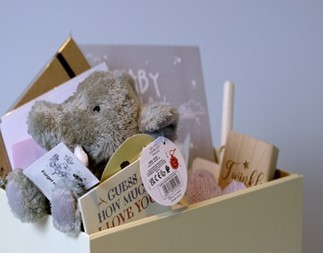Publish date: 9 September 2024
A project which offers support for women whose babies are taken into care at birth has been praised by a team at Blackpool Teaching Hospitals one year on from its launch.
The Trust is one of several organisations to have benefited from a delivery of ‘HOPE boxes’ originating from a project led by Lancaster University. The project aims to give hope, minimise trauma and help women who are separated from their babies at birth.

The mothers’ boxes contain items such as letters from the HOPE mums’ group, an elephant soft toy, chosen because elephants never forget and other items such as soft blankets, photographs and an acknowledgement of life certificate. The baby boxes contain similar items but also feature a baby record book which is designed to be updated by foster carers or kinship carers and shared at family time.
Co-designed with women with lived experience and a group of midwives, including colleagues from the Trust, they help parents capture important memories before they are separated and maintain a connection between them and their baby post-separation.
The HOPE (Hold On Pain Eases) boxes project builds on the ongoing ‘Born into Care’ research at Lancaster University’s Centre for Child and Family Justice Research as part of the work with the Nuffield Family Justice Observatory. Blackpool Teaching Hospitals received 50 boxes last year and has since supported a number of families in Blackpool.
Lisa Elliott, Maternity Matron for community midwives and enhanced care commented: “For the last year we have been offering the HOPE boxes to help ease the trauma when mothers and babies have been separated. For us every birth is special, and because Blackpool has a high rate compared to other areas of the country for babies being born into care we were grateful to Lancaster University for choosing us as one of the recipients of the boxes.”
Claire Mason, project lead at Lancaster University, added: “We hope that this intervention will help improve practice surrounding separation at birth and that when separation is necessary, the HOPE Boxes help ensure that it is done with humanity and compassion and causes the minimal trauma to mothers and their babies.”
Claire has been recognised nationally for her work on this project and has been awarded a National Safeguarding Star for Outstanding Practice from NHS England.



